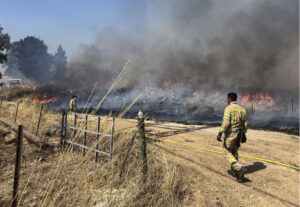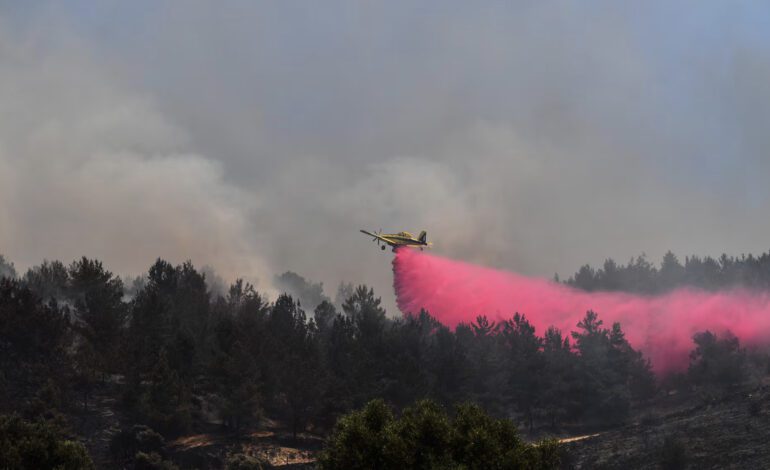Hezbollah fired the most rockets it has launched at Israel in a single day since cross-border hostilities broke out eight months ago, as part of its retaliation on Wednesday for an Israeli strike which killed a senior Hezbollah field commander.
The Iran-backed Hezbollah and Israel have been trading fire since the eruption of the Gaza war in October, in steadily intensifying hostilities that have fueled concern of a bigger confrontation between the heavily armed adversaries.
The Israeli strike in the south Lebanon village of Jouaiyya late on Tuesday killed three Hezbollah fighters alongside the senior field commander Taleb Abdallah, also known as Abu Taleb, Israel and three security sources in Lebanon said.
He was the most senior Hezbollah commander killed during eight months of hostilities, one of the sources said.

Israeli firefighters work following rocket attacks from Lebanon, amid ongoing cross-border hostilities between Hezbollah and Israeli forces, near the border on its Israeli side, June 13. – Photo by Reuters
The Israeli military confirmed that it had killed him as well as the three other Hezbollah fighters in a strike on a command and control center.
The sources in Lebanon said he was Hezbollah’s commander for the central region of the southern border strip.
Hezbollah said it carried out at least 17 operations against Israel on Wednesday, including eight in response to what it called the “assassination” by Israel in Jouaiyya.
In one, Hezbollah fighters fired guided missiles at an Israeli military factory. In another, the group said it had attacked Israeli military headquarters in Ein Zeitim and Ami’ad, and an Israeli military air surveillance station in Meron.
A security source said the group fired some 250 rockets at Israel throughout Wednesday, the most in a day in this conflict so far. More than 100 rockets were launched at once, one of the group’s biggest barrages since the hostilities began in October.
Speaking at a funeral procession for Abdallah in the Hezbollah-controlled southern suburbs of Beirut, senior Hezbollah official Hashem Safieddine said the group would increase the intensity, force and quantity of its operations against Israel in retaliation for his killing.
“If the enemy is screaming and moaning about what happened to it in northern Palestine, let him prepare himself to cry and wail,” Safieddine said.
On Thursday, the group launched rockets and weaponized drones at nine Israeli military sites in a coordinated attack, ramping up hostilities on Lebanon’s southern border for the second consecutive day.
The attacks were made again in retaliation for an Israeli strike on Tuesday that killed a senior Hezbollah field commander.
Hezbollah said in a statement it had fired volleys of Katyusha and Falaq rockets at six Israeli military locations. Its Al-Manar television reported more than 100 rockets fired at once.
The statement said it had also launched attack drones at the headquarters of Israel’s northern command, an intelligence headquarters and a military barracks.
A security source told Reuters that involved firing at least 30 attack drones at once, making it the group’s largest drone attack to date in the eight-month-old war.
Hezbollah gradually revealing more of its capabilities
Hezbollah is drawing on more of its arsenal in its conflict with Israel even as it declares no interest in a full-scale war, an escalation analysts believe aims to deter Israel from a wider confrontation but which could also risk igniting one.
Sparked by the Gaza war, the conflict across the Lebanese-Israeli border has shifted up several gears in the last month, adding to concern the heavily armed adversaries could escalate towards a war that would be ruinous for both countries.
The specter of such a war is looming over the region as U.S.-led mediation struggles to secure a Gaza ceasefire, with increasingly bellicose rhetoric from both Israel and Hezbollah.
Hezbollah has ratcheted up its attacks in several ways of late, sending larger numbers of explosive drones in one go, using a new type of rocket, and declaring that it has targeted Israeli warplanes for the first time — a milestone for the group, according to a source familiar with Hezbollah’s arsenal.
The source familiar with Hezbollah’s arsenal said it is still calibrating its actions with the intention of avoiding all-out war even as it has stepped up its attacks — the approach it has adopted since the conflict started.
The source said Hezbollah had begun escalating with the aim of increasing pressure on Israel as it launched an offensive in Rafah in the Gaza Strip in early May, and also with the intention of gradually unveiling more of its capabilities.
This included the anti-aircraft weapons Hezbollah fired at an Israeli warplane for the first time on June 6, an effort to challenge the air supremacy Israel has long enjoyed, the source said, declining to identify the type of weapon used.
Hezbollah has announced four attacks targeting Israeli warplanes in the last week, saying it had forced them to leave Lebanese air space.
“Hezbollah is showing the kinds of capabilities they have” in an effort to “strengthen deterrence for a conventional war,” said Seth G. Jones, senior vice president at the Center for Strategic and International Studies in Washington.
“The question is what kind of air defense does Hezbollah have and what more could it get from the Iranians and the Syrians. I suspect that any serious indication of serious capabilities would lead the Israelis to hit hard,” he said.
Hezbollah began trading fire with Israel on Oct. 8, a day after its Palestinian ally Hamas attacked southern Israel, sparking the Gaza war. Hezbollah says it will cease fire only when the Gaza war stops.
– Reuters, edited for style






Leave a Reply